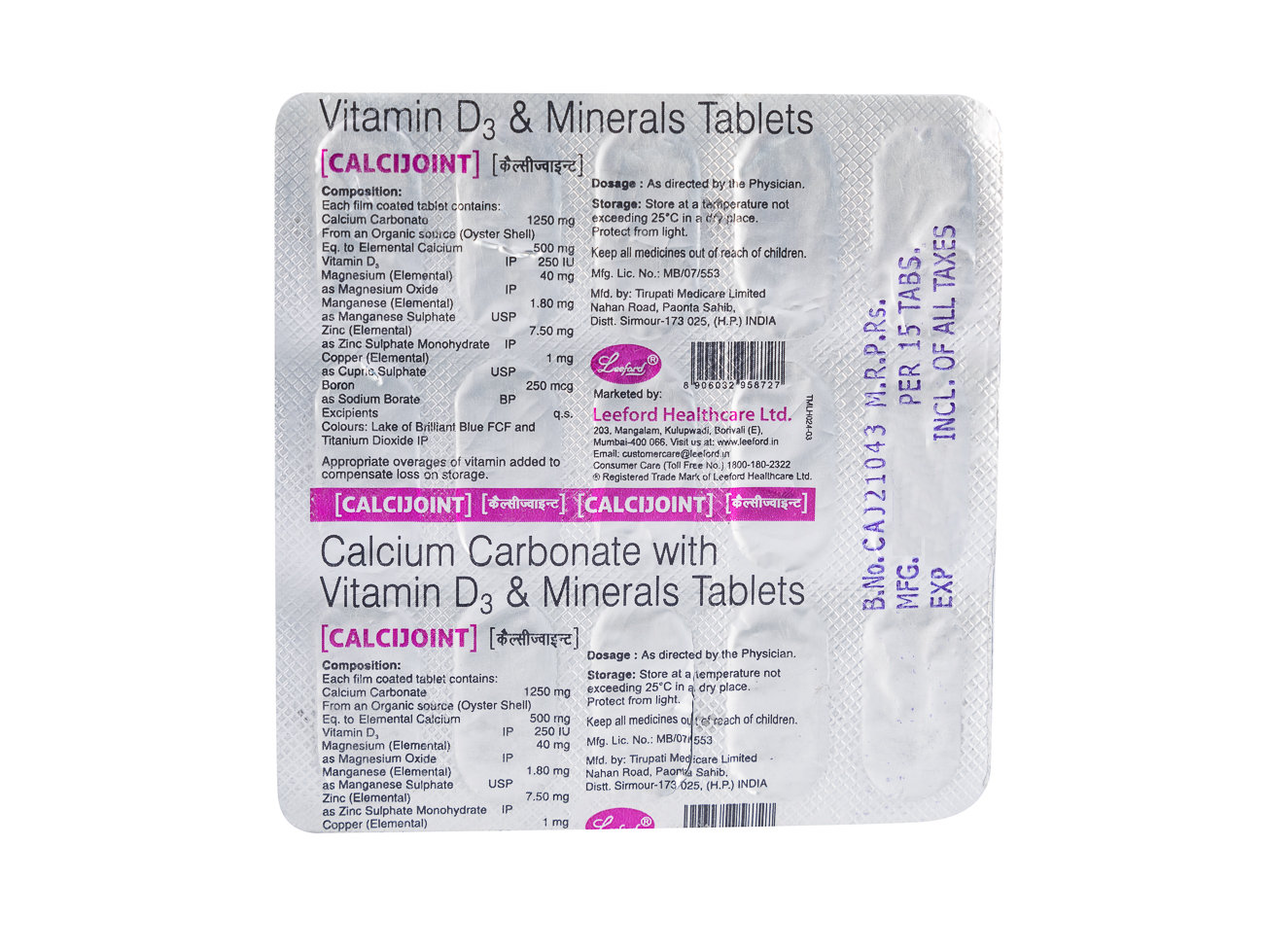Calcium+vitamin D3
About Calcium+vitamin D3
Calcium+vitamin D3 belongs to the class of 'Nutritional supplements', primarily used to treat low blood calcium levels. Calcium+vitamin D3 effectively treats various conditions caused by low calcium levels in the body like Vitamin D deficiency, osteoporosis (weak and brittle bones), hypoparathyroidism (a condition in which parathyroid glands make low levels of calcium in the body), latent tetany (a muscle disease with low blood calcium levels), and rickets or osteomalacia (softening or deforming of bones due to lack of calcium). Vitamin D deficiency occurs when your body has low Vitamin D levels and is caused due to inadequate nutrition, intestinal malabsorption, or lack of exposure to sunlight.
Calcium+vitamin D3 consists of two medicines: Calcium (mineral) and Vitamin D3 (Cholecalciferol). Calcium is a mineral used to prevent or treat a calcium deficiency. It provides essential nutrients to maintain bone formation and maintenance. Vitamin D3 helps maintain blood calcium and phosphorus levels and mineralization of bone. It is used to treat and prevent bone disorders, such as rickets and osteomalacia.
Your doctor will decide the dosage based on your medical condition. Calcium+vitamin D3 is likely safe to use. In some cases, it may cause common side effects like constipation and stomach upset. These side effects do not require medical attention and gradually resolve over time. However, you are advised to talk to a doctor if the side effects persist or worsen.
If you are allergic to Calcium+vitamin D3 or its inactive components, please inform your doctor. Please tell your doctor if you have hypercalcaemia (high calcium levels), hypervitaminosis D (high vitamin D levels), heart/kidney/liver/blood vessel diseases, kidney stones, and malabsorption syndrome (difficulty absorbing nutrition from food) before starting Calcium+vitamin D3. Pregnant or breastfeeding women should consult their doctor before taking Calcium+vitamin D3. This supplement should be used in children only when advised by the doctor.
Uses of Calcium+vitamin D3
Medicinal Benefits
Calcium+vitamin D3 is used to treat low blood calcium levels. It effectively treats various conditions caused by low calcium levels in the body like Vitamin D deficiency, osteoporosis, hypoparathyroidism, latent tetany, and rickets or osteomalacia. Calcium+vitamin D3 consists of two medicines: Calcium (mineral) and Vitamin D3 (Cholecalciferol). Calcium is a mineral used to prevent or treat a calcium deficiency. It provides essential nutrients to maintain bone formation. Vitamin D3 helps maintain blood calcium and phosphorus levels and mineralization of bone. It aids in calcium absorption enabling bone growth and repair. It further prevents cartilage degeneration.
Directions for Use
Storage
Side Effects of Calcium+vitamin D3
- Constipation
- Stomach upset
Drug Warnings
Let your doctor know if you are allergic to Calcium+vitamin D3 or its inactive components. Calcium+vitamin D3 is not recommended if you have hypercalcaemia (high calcium levels), hypervitaminosis D (high vitamin D levels), and malabsorption syndrome (difficulty absorbing nutrition from food). Brief your medical history to the doctor if you have any heart/kidney/liver/blood vessel diseases, kidney stones, achlorhydria (little or no stomach acid), low levels of bile, and phosphate imbalance before starting Calcium+vitamin D3. Consult your doctor before taking Calcium+vitamin D3 if you are pregnant or breastfeeding. Drinking alcohol can affect calcium absorption; therefore, it is advised to limit the alcohol intake while using Calcium+vitamin D3. Calcium+vitamin D3 is safe to use in children only when advised by the doctor.
Drug Interactions
Drug-Drug Interaction: Calcium+vitamin D3 may interact with drugs treating high cholesterol levels (cholestyramine, colestipol), antibiotics (doxycycline, ciprofloxacin, levofloxacin, penicillin, neomycin, and chloramphenicol), anti-cancer drugs (estramustine), drugs treating bone loss (alendronate), thyroid hormone (levothyroxine), weight-loss drugs (orlistat), fits medicines (phenobarbital), mineral oils, water pills (furosemide, etacrynic acid), and heart-related medicines (digitoxin).
Drug-Food Interaction: Avoid or reduce the intake of caffeine, soft drinks and alcohol as they might inhibit calcium absorption.
Drug-Disease Interaction: Calcium+vitamin D3 is not recommended in conditions such as hypercalcaemia, hypervitaminosis D, malabsorption syndrome, and Vitamin D toxicity. Please consult your doctor for more advice.
Drug-Drug Interactions Checker List:
Safety Advice

Alcohol
cautionDrinking alcohol can affect calcium absorption; hence it is advised to limit/avoid alcohol intake while using Calcium+vitamin D3.

Pregnancy
cautionConsult your doctor if you are pregnant. Your doctor will weigh the potential risks and benefits before recommending Calcium+vitamin D3.

Breast Feeding
cautionPlease consult your doctor before taking Calcium+vitamin D3 if you are breastfeeding. Your doctor will weigh the potential risks and benefits before recommending Calcium+vitamin D3.

Driving
not applicableCalcium+vitamin D3 usually does not interfere with your driving ability.

Liver
cautionLet your doctor know if you have any history of liver diseases before taking Calcium+vitamin D3. Hepatic impairment/liver disease can alter the metabolic and therapeutic activity of certain Vitamin D forms.

Kidney
cautionIt is advised to seek doctor's advice before starting Calcium+vitamin D3 if you have kidney diseases like kidney stones or undergoing dialysis.

Children
cautionThe doctor will decide the dosage of Calcium+vitamin D3 based on the child's age and weight.
Habit Forming
Diet & Lifestyle Advise
- Include dairy products like milk, yoghurt, cheese or milk-based custard in your diet.
- Eat daily a serving of broccoli, cabbage, bok choy, spinach and other green leafy vegetables.
- Include the best dietary sources of vitamin D, such as fish liver oils and vitamin D–fortified milk.
- Snack on calcium-rich nuts like Brazil nuts or almonds.
- Sprinkle sesame seeds over your food, vegetables and salads. Sesame seeds are high in calcium.
- Avoid or reduce the intake of caffeine, soft drinks and alcohol that inhibit calcium absorption.
- Replace the meat with tofu or tempeh for extra calcium in your food.
Special Advise
It is advised to timely monitor your Vitamin D levels through blood examination.
Patients Concern
Disease/Condition Glossary
Vitamin D deficiency: When a person cannot get enough Vitamin D through food and exposure to sunlight, it leads to vitamin D deficiency. It often leads to thin, brittle or misshapen bones.
Osteoporosis: It is a bone disease that makes the bones weak and brittle by decreasing bone density.
Tetany: A disease condition due to low calcium levels (hypocalcaemia) in the body that causes cramps and spasms in the hands, feet, and larynx (voice box).
Osteomalacia/Rickets: A disease caused by softening and weakening of bones in children due to inadequate vitamin D.
Hypoparathyroidism: It is a disease characterized by low levels of parathyroid hormone. This can cause low calcium levels and trigger tetany (muscle cramps, spasms or tremors).
FAQs
Calcium+vitamin D3 consists of Calcium and Vitamin D3. Calcium is a mineral, it prevents or treats calcium deficiency. Vitamin D3 (Cholecalciferol) helps maintain blood calcium and phosphorus levels and mineralization of bone. When you don't get enough Vitamin D from food sources and sunlight exposure, Calcium+vitamin D3 helps replenish those low levels.
If you miss a dose, take it as soon as you remember. However, if it is time for the next scheduled dose, skip the missed dose and follow your usual dosage
Milk is considered to be the best source of calcium. You can take the tablet/capsule with milk.
Calcium+vitamin D3 is used to increase low levels of calcium in the body. Hence, it is not advised to use Calcium+vitamin D3 if you have hypercalcaemia since it causes the overdose of calcium leading to kidney stones and other effects.
Antacids may increase the absorption of Calcium from Calcium+vitamin D3. Hence, taking Calcium+vitamin D3 two hours before or four hours after taking antacids is advised.







